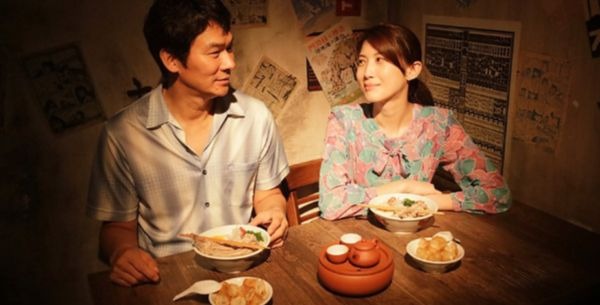Tokyo International Film Festival 2018: RAMEN TEH: A Heartwarming Foodie Delight

Tynan loves nagging all his friends to watch classic movies…
As Ramen Teh (Ramen Shop in some countries) begins to reveal more and more of its central narrative, I couldn’t help but recall reading How My Parents Learned to Eat as a child. For those familiar with the book, it’s one of the best entry points I can reference for this film, boasting such common denominators as family and food.
For those who don’t know, this children’s book follows a young daughter’s point of view as she details how her parents, one an American sailor, the other a Japanese woman, fell in love and learned to eat each other’s food. The cuisine is certainly a crucial part of their respective cultures but it’s also an extension of who they are and how they appreciate one another.
The movie, directed by Eric Khoo, toys with analogous ideas, this time involving a Japanese man (Tsuyoshi Ihara) and his Singaporean wife (Jeanette Aw). It too is told from the point of view of their child, a son named Masato (Takumi Saito). However, none of these facts are made obvious right away.
The boy is older and works in his father’s ramen shop when the story opens. The man is old and grey, his wife having passed away many years ago, and jaded by life without her, he soon follows suit. One could say he died of a broken heart. There could not be a sadder introduction to a tale. But then Masato sets out on a mission destined to bring so much restoration into his life. Although he is now parentless, his childhood recollections still burn brightly in his mind’s eye. They prove to be his guiding light in the days to come.
The road ahead promises self-discovery through food because it not only provides a deeper connection with his culture but by extension, his parents as well. It becomes continually apparent the two cannot be separated; they are almost one in the same. His is a noble pursuit to honor his parents and keep the memory of them alive. However, it is a mutually beneficial endeavor affecting others as well.
Discovering Food and Family
As the story unravels methodically, the aspiring chef makes acquaintance with a Japanese blogger (Seiko Matsuda) now living in Singapore and he seeks her guidance. She is an amiable soul who befriends him graciously and acts as a mentor.
We see the love story as it happened years before. His father patronizing his mother’s restaurant and trading genial pleasantries. The fact they speak in English and make use of their few token phrases in one another’s languages is an adorable touch. The subsequent courtship over food begins in earnest as they prepare special meals for one another.

The boy’s odyssey reaches the uncle he knew so long ago, who now runs his own successful restaurant in Singapore. Their reunion is utterly unexpected but full of good-will. He is brought into the family with the kind of stifling hospitality that can be expected on such an occasion. Mark Lee gives a hilarious performance positively overwhelming Saito‘s more taciturn sensibilities. It’s a lovely dynamic.
The final person to meet is Grandmother, the boy’s last link to his mother, except she has never forgiven her daughter for marrying a foreigner. Her animosity toward Japan goes back all the way to the travesties of WWII. And for her, even all these years later, Masato is a reminder of not only those times but more painfully still, the deep wounds that have never healed since her daughter’s death.
The Power of Reconciliation
She hates herself for never reconciling with her child even as she remains aloof around Masato. He cannot understand why she could harbor so much animosity even as he tries to comprehend some of the complicated history between Japan and Singapore on his own. This is Ramen Teh at its best. Because there are multiple elements tied together by this universal narrative. It is an overwhelmingly heartwarming film but this one source of hurt is the necessary wound in need of healing.

Masato calls upon the expertise of his uncle and his own burgeoning skills to craft a very special meal for his grandmother. His very identity is perfectly represented in a bowl of ramen coupled with bak kut teh (pork rib broth), creating a fusion of the Japanese and Singaporean cultures. When she finds it left on her doorstep and sits down to eat, it’s a fitting symbol of acceptance.
Food is a love language for some and especially in Asian cultures which are often notoriously bad at displaying affection, a meal is a way to tell others in tangible terms how much you care for them. It is meaningful given the film is about different languages. Masato and Grandmother don’t even speak the same language but they can communicate through food. It is enough.
Ramen Teh: Conclusion
From start to finish, Ramen Teh is a joy, and while it caters to some bittersweet sentimentality, there is also a resounding hopefulness which lingers. Criticisms might easily be leveled at the saccharine qualities. They can hardly be disputed. But I buy the perspective framed as it from that of a child and then a son, not a callous adult.
There’s nothing more sensitive than those feelings rooted deep in your youth. It taps into our earliest, most innate memories. When your mom would make you meals and your father was young and alive, not yet burdened by tragedy. For Masato, they were happy times with family. But of course, by the end of this film, he’s rediscovered his family anew. Seek and you will find. He certainly does.
While Tampopo was the first film I ever knew to use ramen as an integral plot device, the more sensitive candor of Ramen Teh is reminiscent of the TV Show Midnight Diner, the “Omelette Rice” episode specifically, courting themes of intercultural romance. At its best, this film unabashedly champions a sweetness as delectable as the mouth-watering concoctions in each frame. Obviously, it is best appreciated on a stomach full of ramen and chashu pork (or bak kut teh) made by loving hands.
What is your favorite film featuring food prominently? What makes food such an integral part of family, cultural identity, and even our personal memories?
Ramen Teh was shown at the Tokyo International Film Festival on November 1st, 2018.
Does content like this matter to you?
Become a Member and support film journalism. Unlock access to all of Film Inquiry`s great articles. Join a community of like-minded readers who are passionate about cinema - get access to our private members Network, give back to independent filmmakers, and more.
Tynan loves nagging all his friends to watch classic movies with him. Follow his frequent musings at Film Inquiry and on his blog 4 Star Films. Soli Deo Gloria.












